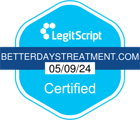What is Alcohol Rehab?
Alcohol rehab, short for alcohol rehabilitation, is a structured and comprehensive treatment program designed to help individuals struggling with alcohol addiction or alcohol use disorder (AUD) overcome their dependence on alcohol and achieve sobriety.
Important things to know about alcohol rehab:
- Treatment Options: Alcohol rehab programs can vary widely in terms of their approaches and settings. There are inpatient (residential) rehab programs, where individuals stay at a facility full-time, and outpatient programs, where individuals attend treatment sessions while continuing to live at home.
- Assessment and Customization: Effective alcohol rehab programs begin with a thorough assessment of the individual’s physical health, mental health, and severity of addiction. Treatment plans are then tailored to the specific needs of the person.
- Detoxification: Many people entering alcohol rehab need to go through a detoxification process to safely manage withdrawal symptoms as the body adjusts to the absence of alcohol. Detox is usually supervised by medical professionals to ensure safety.
- Therapeutic Approaches: Rehab programs typically include various therapeutic approaches to address the psychological and emotional aspects of addiction. These can include individual counseling, group therapy, family therapy, cognitive-behavioral therapy (CBT), motivational interviewing, and more.
- Education: Education about alcohol addiction and its effects is a common component of rehab. This helps individuals understand the physical, psychological, and social consequences of their addiction, which can motivate them to make positive changes.
Relapse Prevention: Alcohol Rehab
Learning strategies to prevent relapse is a crucial part of alcohol rehab. Individuals are taught coping skills, stress management techniques, and ways to handle triggers and cravings without turning to alcohol. Many alcohol rehab programs incorporate support groups such as Alcoholics Anonymous (AA) or similar organizations. These groups provide a sense of community and ongoing support for individuals in recovery.
Some individuals with alcohol addiction may have underlying mental health disorders (dual diagnosis). Effective rehab programs address both the addiction and any co-occurring mental health issues.
Aftercare and Follow-Up After Alcohol Rehab
Successful rehab programs include aftercare planning to support individuals as they transition back to their regular lives. This can involve ongoing therapy, support group participation, and regular check-ins to prevent relapse.
The duration of an alcohol rehab program can vary based on the individual’s needs and progress. Some programs last for a few weeks, while others may extend to several months.
Medical professionals play a crucial role in alcohol rehab, especially during detox and when there are medical complications related to alcohol use.
Cost and Insurance: Alcohol Rehab
The cost of alcohol rehab can vary widely based on factors like location, type of program, and amenities. Many health insurance plans may cover a portion of rehab expenses, so it’s important to check with your insurance provider.
Remember that seeking help for alcohol addiction is a positive step towards improving your health and well-being. If you or someone you know is struggling with alcohol addiction, it’s recommended to reach out to a healthcare professional or addiction specialist to discuss treatment options.

